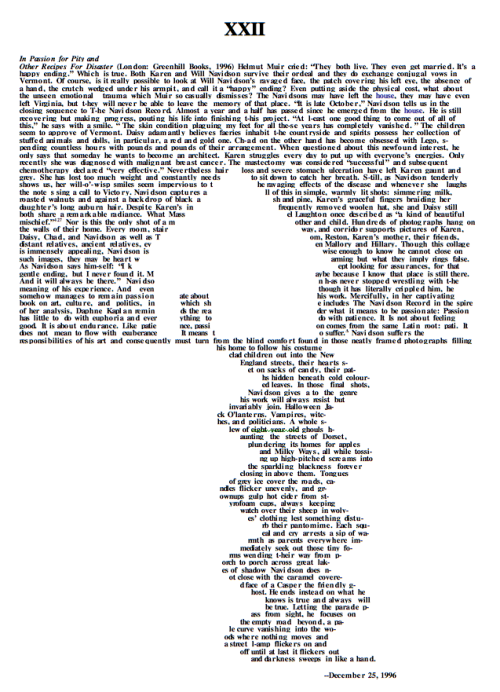Michael heim defines hypertext as-
“printed text as a basis for a techonlogy that considerably extends writing’s reach and repetoire by removing text from the single dimension it has on the printed page”
after reading this quote and doing this week’s readings on hypertext, a book my sister was showing me a few weeks ago instantly came to mind. while the book is classed as ‘post-modern’ fiction, I immediately thought of it after reading the definition of hypertextual narrative. but I’m not going to tell you why. I’m just going to show you-

while postmodernism and hypertextual narrative might not be the same thing, jay bolter states in literature in the electronic space that “hypertext is a vindication of postmodernist literary theory“. there are obvious connections between postmodernism and hypertextual narrative and while they may differ when you come down to specifics, mark danielewski’s house of leaves sure looks, feels and sounds to me like a hypertextual narrative. it plays with the written form itself as well as having stories within stories, interwoven narratives, segments, other type of texts like images and poems within the story, etc and ultimately looks like a headache to read. there are even entire segments which appear like ‘windows’ in the middle of the books, showing the text backward… are you really going to sit there with a mirror and read the backward text? ain’t nobody got time for that. personally, I am in two minds about this form of narrative, and by extension hypertextual narrative. the student and artist in me wants to say ‘oh how original and brilliant, what a challenging yet rewarding way to experience a narrative’ and respect the sheer expansiveness that this sort of a medium offers…
the other (more cynical) part of me wants to say, in a nutshell, what this person has so eloquently written in a review of house of leaves-
“I wish there were some way that a sigh could count as a book review… I think it’s a really great story. However, House of Leaves is the perfect definition of bullshit… This book looks at you with this smug fucking smile on it’s face, daring you to say that you don’t like it, knowing that masses of people are going to go along with it because they don’t want to look stupid. That’s what this is. It’s the fucking Radiohead of books. Well, House of Leaves, I am not stupid and I’m calling your bullshit. Fuck you.”

…and to be honest, the guy kind of has a point. hypertextual narrative is a little bit pretentious. it almost seems like an excuse for authors to churn out pages upon pages of meaningless dribble in the name of ‘art’. it puts pressure on its readers to make associations and understand greater concepts or ideas and, by extension, makes them feel stupid if they can’t engage, or just don’t ‘get it’. did it come to be just because author’s got too lazy writing stories that were engaging enough in their normal format? maybe I’m just being too skeptical. maybe I am thinking more about postmodern literature than hypertextual narrative. after all, the two aren’t necessarily the same thing (even though the definition of hypertextual narrative seems to describe “house of leaves” down to the last letter). maybe there is some big difference between the two that I’m not getting (and my guess is I’m going to get a comment on this sooner or later explaining what that is) either way, here are some point form notes from the readings –
the digital word and image, even on the web, does not inevitably produce hypertextual narrative
hypertext is as much a concept in itself a technology
“veer toward a narrative…not entirely dependent on linearity, causality, and probable characterisation” – Tom McHarg
“a fictional text must be stretched, skewered, and sliced if it is to exploit the freedoms and accept the responsibilities offered by hypertext technology and its new writing spaces”
can be one main narrative or narrative segments and entirely fictional stories which are weaved together by these
1. reader choice intervention and empowerment
2. inclusion of extralinguistic texts (images, motion, sound)
3. complexity of networked structure
4. degrees of multiplicity and variation in literary elements such as plot, characerisation, setting
hypertext calls into question
1. fixed sequence
2. definite beginning and ending
3. a story’s certain definite magnitude
4. the conception of unity or wholeness associated with all these other concepts
hypertext as a lens or agent of new perception, to reveal something previously unnoticed or unnocticable
authors can write in such a way to provide the reader with informed choices
the authors either prefer authorial power, readier disorientation or both
doing away with a fixed linear text does away with all linearity or removes formal coherence
parataxis > repeitition rather than sequence
Bolter says of Joyce’s interactive hypertext “there is no single story of which each reading is a version, because each version determines the story as it goes. we could say that there is no story at all: there are only readings”
how can hypertext have a beginning when the novel follows from the beginnings each reader chooses?
‘start here’ approach comes from some writer’s reluctance to disorient readers upon initial contact with a narrative
hypertextual fiction should change our experience of the middle but not the beginnings of narrative fiction
you need closure, equilibrium, conclusion when experiencing a text
many points of closure within the text, rather than one definite ‘ending’

 (the chicken came first)
(the chicken came first)





